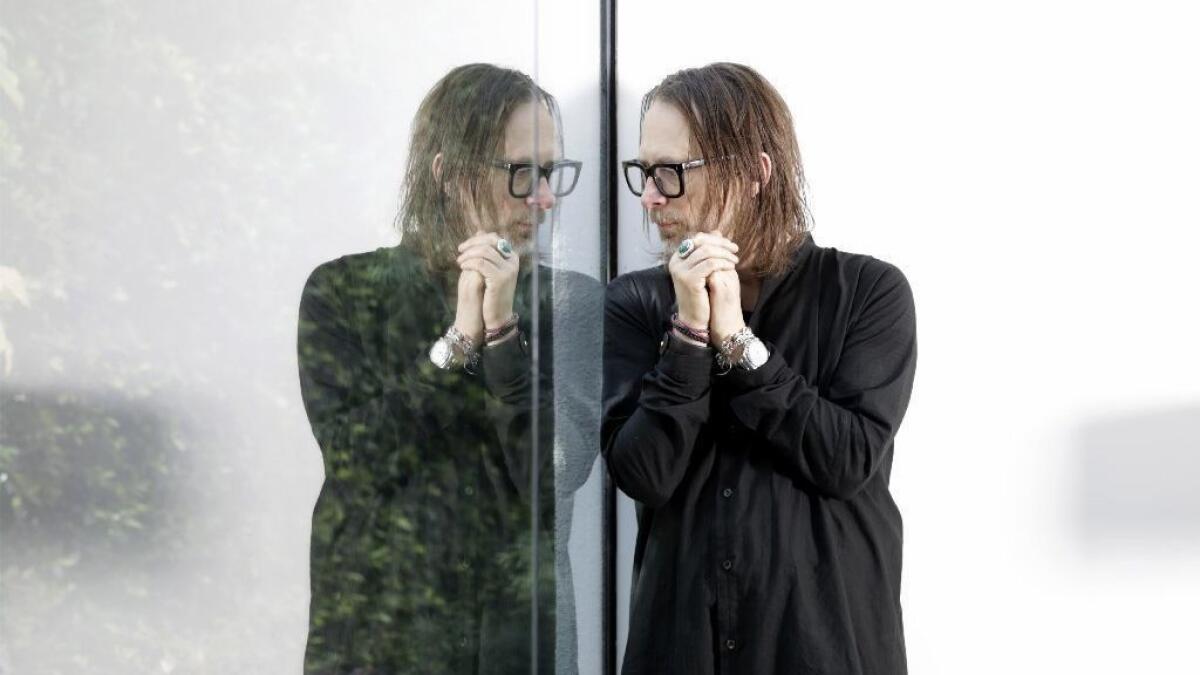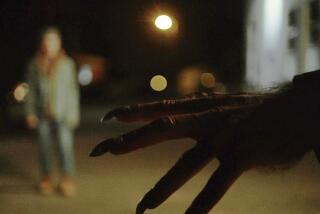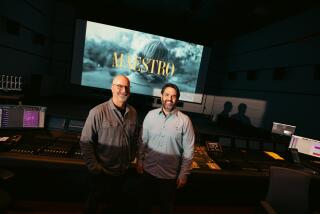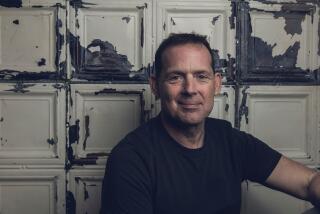Drawn to its ‘feminine collective energy,’ Thom Yorke takes the ‘Suspiria’ score to dark places

When you need an original soundtrack to a reimagined supernatural horror classic haunted by themes of witchcraft, Holocaust guilt and cheating death, set in the Berlin autumn of 1977 and featuring a second-act narrative titled “Palaces of Tears,” who are you going to call? Thom Yorke, of course.
Inevitably, backup alternatives existed in case the Radiohead frontman declined to conjure seances for Luca Guadagnino’s “Suspiria,” but it’s difficult to imagine anyone better suited than the legendarily melancholic British musician. Still, there was the matter of convincing Yorke, who had heretofore left soundtrack work to his Oscar-nominated bandmate Jonny Greenwood, the recipient of numerous accolades for his collaborations with director Paul Thomas Anderson.
“I’ve always balked at the normal Hollywood-speak I’ve heard,” Yorke says sitting cross-legged on a couch in a rented house in the Los Feliz hills. He’s wearing all black. Light-brown lank hair hangs below his chin; flecks of gray dapple his beard; multicolored beaded and leather bracelets adorn his wrists. His eyes are hyper-focused and intense underneath black box-frame glasses.
“They’d pitch me an idea and I’d be like, ‘Even if I did like this idea, I wish you wouldn’t speak to me like that.’”
Over the last two decades, Radiohead’s cerebral black-rose hymns evoked cinematic pathos in films ranging from “Children of Men” to “Clueless,” “Romeo + Juliet” to “A Scanner Darkly,” but until the director of 2017’s “Call Me by Your Name” came calling, Yorke rebuffed even the most persistent suitors.
I don’t normally feel a connection to most people, but I felt one with [Guadagnino], the editor Walter [Foasano] and the producers.
— Thom Yorke
“I don’t normally feel a connection to most people, but I felt one with [Guadagnino], the editor Walter [Fasano] and the producers. I liked the recklessness with which they were approaching the original.”
Yorke has cultivated an inscrutable and ethereal presence. As he’s notoriously cryptic and press-averse, you almost expect him to appear shrouded in numinous fog, speaking in orphic koans. But in person, he is quick-witted, forthcoming and prone to the body-rattling laughter that you wouldn’t expect from the person who wrote “Paranoid Android.”
At 50, he seems to have lightened with age, having survived myriad controversies and personal tragedy (his longtime partner and the mother of his two children, artist Rachel Owen, died in December 2016). The bleak inclinations, however, remain unmistakable on record.
Live review: Meet Thom Yorke, uneasy rock star turned potential Oscar nominee »
“I was really drawn to the idea of the feminine collective energy,” Yorke explains of his initial attraction to the “Suspiria” script. “I was fascinated by the idea of dance rituals as a way of cheating death. … the idea of one thing appearing on the surface and then another behind it. And, obviously, it being set in Berlin in 1977, it felt right, even though I didn’t know what I was getting into!”
He laughs and pauses a beat:
“And then [Guadagnino] started saying things like, ‘I need something for a Sabbath in Germany for a woman who sings like a man.’ ”
The celestial yawp and elegiac songwriting gifts that suffuse Yorke’s solo work and Radiohead collaborations are endemic on “Suspiria.” So is his irrepressible desire to experiment and tweak convention. An avowed ’70s synthesizer nerd, Yorke leaned heavily on vintage equipment to create the eerie instrumentals that are as far away from Goblin’s soundtrack to the 1977 original as Guadagnino’s somber and gray-scale tones diverge from Dario Argento’s vision.
FULL COVERAGE: Get the latest on awards season from The Envelope »
Its closest thing to a single, “Suspirium” is a gorgeous death waltz shrouded in Yorke’s sepulchral croon and is among the 15 original film songs short-listed for the Oscar nominations.
Greenwood advised his partner to avoid writing to a loop of the film’s scenes, instead relying on memory and internal emotion. For two songs, Yorke enlisted his son to play drums. There’s also a political discontent that factored into the album.
“I couldn’t ignore [the political situation],” Yorke says. “There was a lyric that I’d read in the script that I kept coming back to while watching Trump speak … that ‘we won’t let this happen again.’”
As far as future soundtrack work, Yorke demurs about whether he’ll do more. But it’s clear he enjoyed the inherent creative challenges imposed by the limitations of doing work on commission. Nonetheless, Thom Yorke will always be Thom Yorke.
“I was going through a lot of difficult … in my life when recording this,” Yorke says. “But I feel like the project offered a different opportunity to play music outside of where I normally go. I’m proud that I was able to just say to myself, ‘Let’s do this and create something so … dark.’ ”
“By the end of it,” Yorke laughs again, taking a breath and flashing a self-aware smile that almost seems like a wink — except Thom Yorke does not wink. “Even I was shocked how dark it was.”
More to Read
From the Oscars to the Emmys.
Get the Envelope newsletter for exclusive awards season coverage, behind-the-scenes stories from the Envelope podcast and columnist Glenn Whipp’s must-read analysis.
You may occasionally receive promotional content from the Los Angeles Times.






